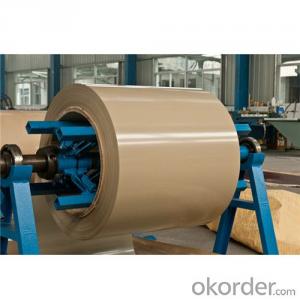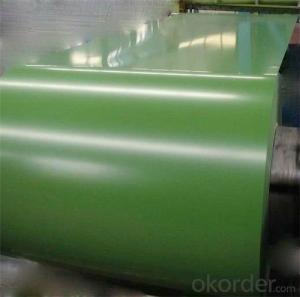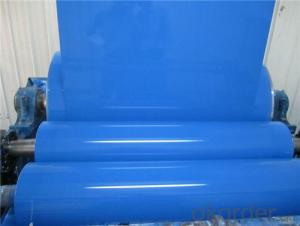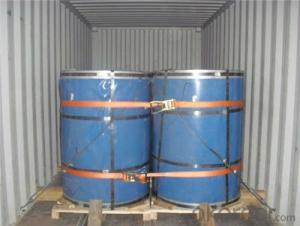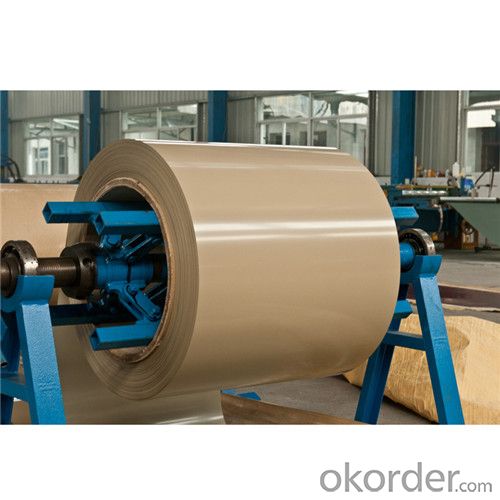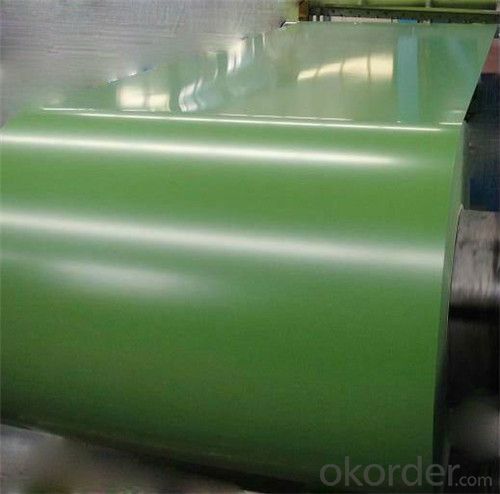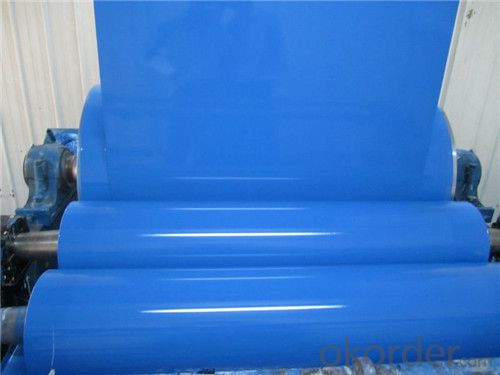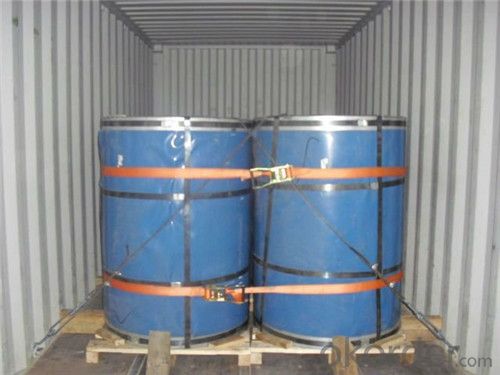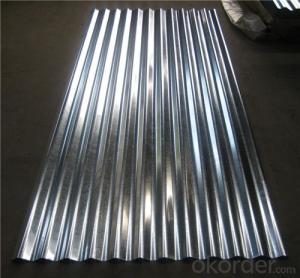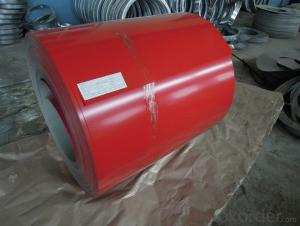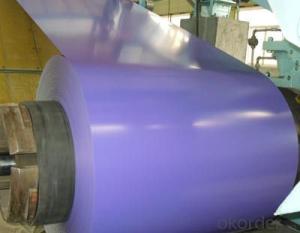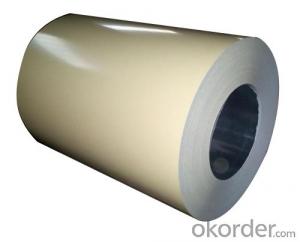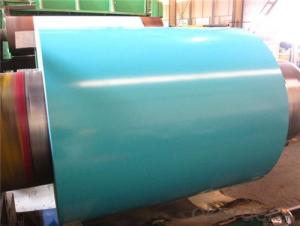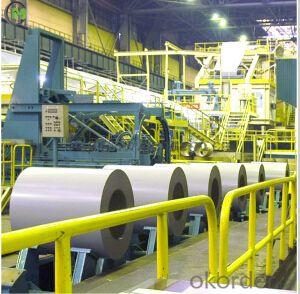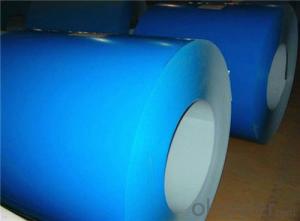Prepainted Z60 Rolled Steel Coil for Sandwich panel
- Loading Port:
- Shanghai
- Payment Terms:
- TT OR LC
- Min Order Qty:
- 50 m.t.
- Supply Capability:
- 30000 m.t./month
OKorder Service Pledge
OKorder Financial Service
You Might Also Like
Structure of Prepainted Z60 Rolled Steel Coil for Sandwich panel
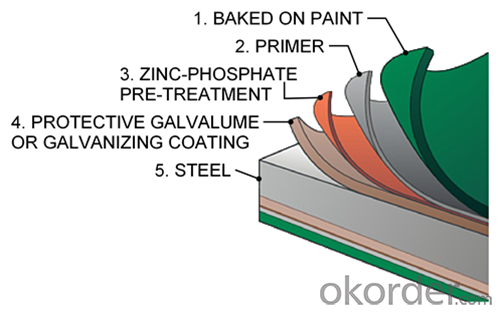
Description of Prepainted Z60 Rolled Steel Coil for Sandwich panel
Prepainted Rolled steel Coil is a kind of coated steel coil/sheet. With the cold rolled steel of different strength and thickness as substrate, it is produced through applying Al-Zn coat on both faces by hot dip process. In its coating, Al accounts for about 55%, Si 1.6%, while the remaining is Zn. Aluminum zinc coils enjoys both the physical protective feature and durability of Al and the electrochemical protective property of Zn. And its surface has bright silver color and regular embossed-like figure, which are highly decorative.
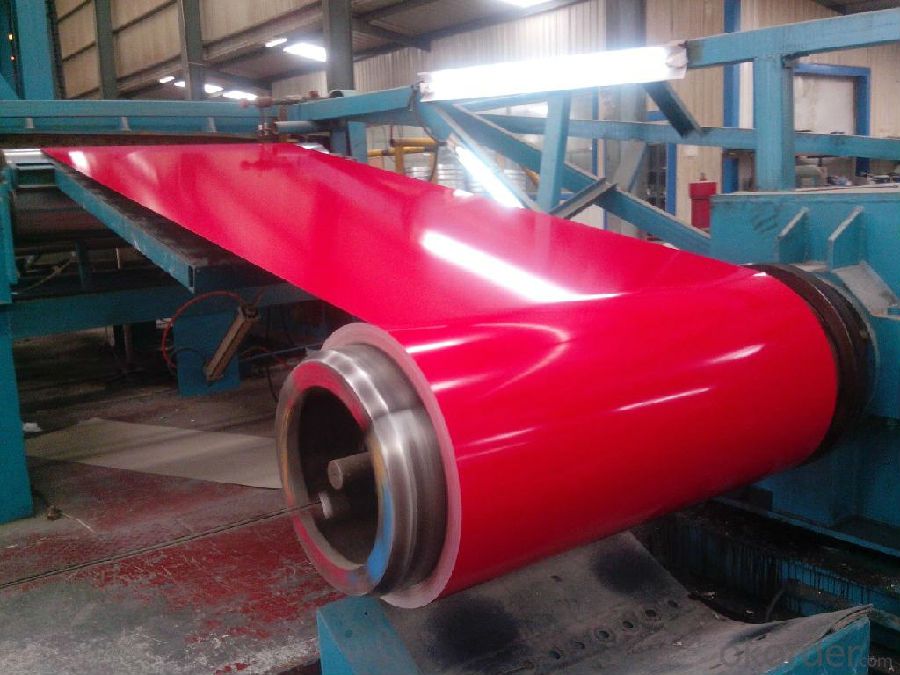
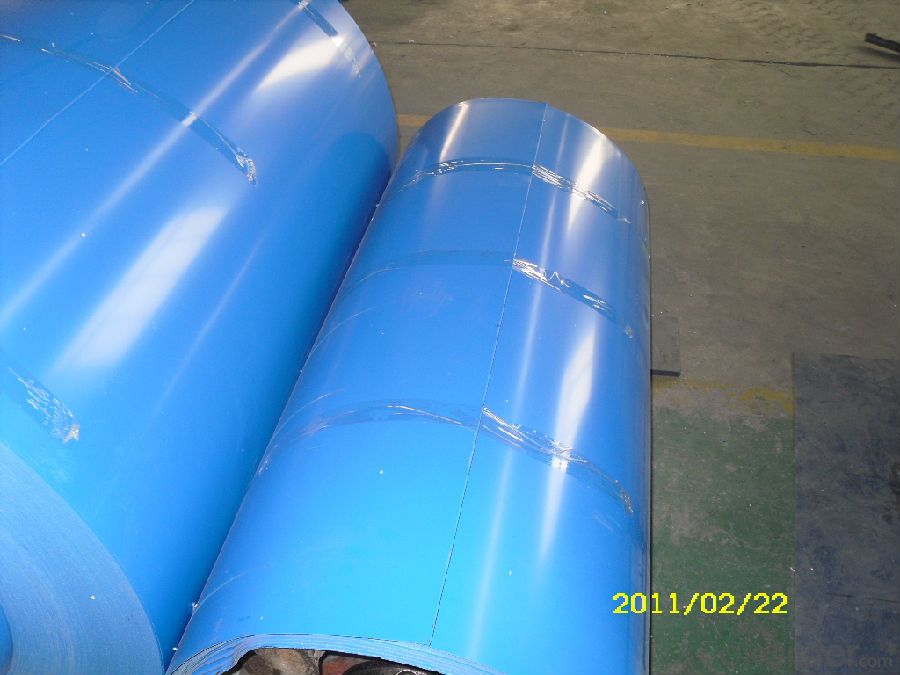
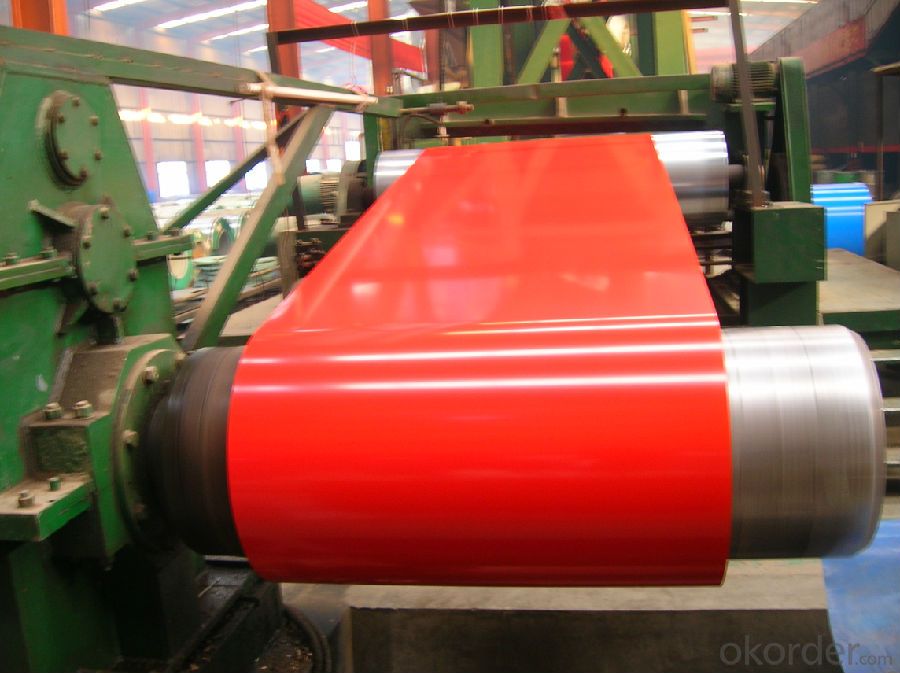
Main Feature of Prepainted Z60 Rolled Steel Coil for Sandwich panel
1.Corrosion resistance: It mainly depends on the aluminum protection. When the zinc being worn, the aluminum will form a dense layer of aluminum oxide, resist corrosion material to prevent further corrosion inside.
2. Heat resistance: Aluminum zinc alloy steel sheet has excellent heat resistance, can withstand high temperatures over 300 centigrade, and is similar with aluminized steel high temperature oxidation resistance. It often used in chimney pipes, ovens, fluorescent lighting device and the device cover.
3. Heat reflective: Galvanized steel plate heat-reflective high rate is twice as galvanized steel, often used to make insulation materials.
4. Economy: Because density of 55% AL-Zn is smaller than the density of Zn, so in the same weight and thickness of Galvanized zinc layer, aluminum-zinc steel plate is larger area more than 3% of galvanized steel sheet.
Applications of Prepainted Z60 Rolled Steel Coil for Sandwich panel
1. Construction and building: roofing; ventilating duct; handrail; partition panel;etc.
2. Electric appliance: refrigerator; washing machine; refrigerator; DVD;etc.
3.Transportation: oil tank; gas tank;pentane tank; road sign; etc.
4.Agriculture:barn; etc.
5.Others:vending machine; game machine; etc.
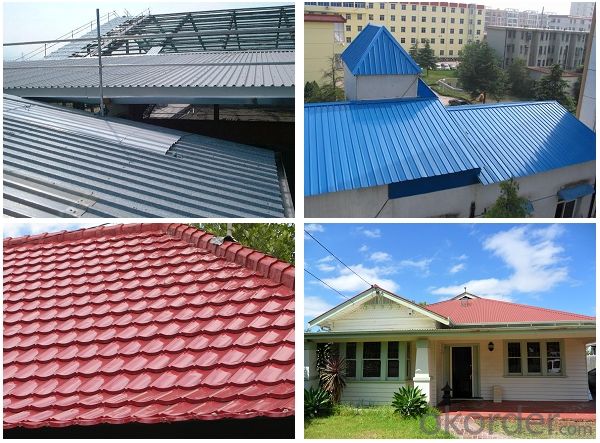
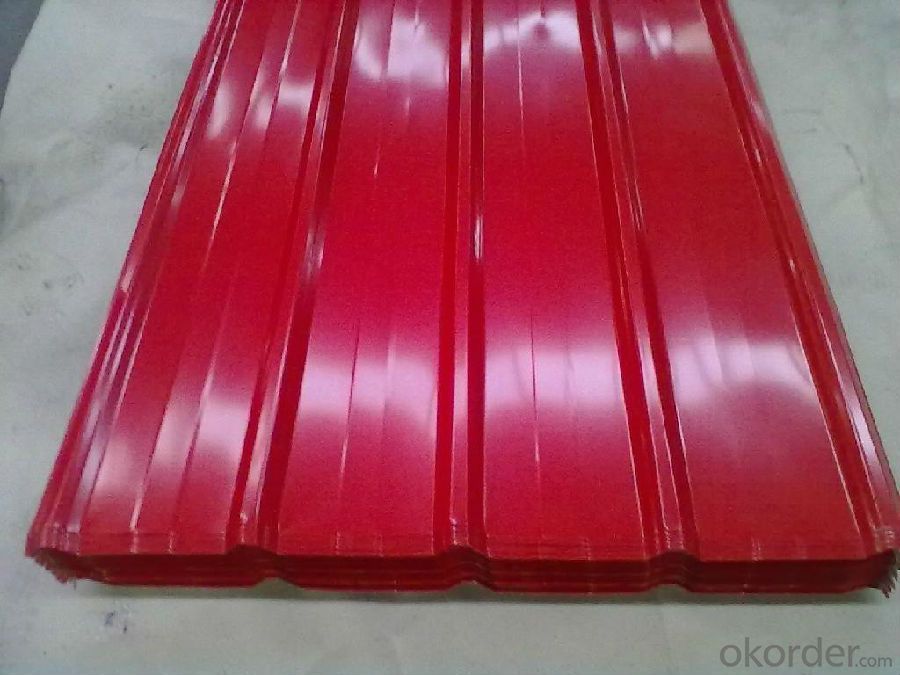
Specifications of Prepainted Z60 Rolled Steel Coil for Sandwich Panel
Product | Prepainted Z60 Rolled Steel Coil for Sandwich Panel |
Material Grade | SGCC / SGCH / DX51D+AZ, etc |
Thickness | 0.7-3.0mm |
Width | 700-1500mm |
Tolerance | Thickness: +/-0.02mm , Width:+/-2mm |
Zinc-coating | Z40-150g/m2 |
Technique | Raw material: Hot rolled steel coil --> Cold rolled_>hot dipped galvalume |
Surface | Dried, Chromated, Unoiled |
Spangle | Regular spangle , small spangle, zero spangle |
ID | 508MM 610MM |
Coil weight | 10MT max |
Export package | Cardboard inner sleeves, Waterproof paper, galvanized steel covered and steel strip packed |
FAQ of Prepainted Z60 Rolled Steel Coil for Sandwich Panel
We have organized several common questions for our clients,may help you sincerely:
1. What is the minimum order quantity ?
Our MOQ is 50mt for each size. And we will consider to give more discount if you make big order like 1000 tons and more. Further more, the more appropriate payment term your offer the better price we can provide.
2. How long can we receive the product after purchase?
Usually within thirty working days after receiving buyer’s advance payment or LC. We will arrange the factory manufacturing as soon as possible. The cargo readiness usually takes 15-25 days, but the shipment will depend on the vessel situation.
3. How to guarantee the quality of the products?
We have established the international advanced quality management system,every link from raw material to final product we have strict quality test;We resolutely put an end to unqualified products flowing into the market. At the same time, we will provide necessary follow-up service assurance.
- Q: How are steel coils used in the production of construction machinery?
- Steel coils are used in the production of construction machinery as they are a primary raw material for manufacturing various components such as structural frames, chassis, and other heavy-duty parts. These coils are typically processed and fabricated through cutting, bending, welding, and shaping techniques to create the required components that form the foundation of construction machinery.
- Q: What products can we make with steel (eg Steel strip, rod, bar, rail, tube) How are these made? What can we make from these steel products?Can you please make the answers as detailed as possible you can because i really want to know this really well. Thank you.
- Your okorder (they make steel deck and steel joists) There are thousands of other items routinely produced from steel, including rebar, and all the metal in cars, airplanes, and about a million other things.
- Q: What are the common size limitations for steel coils?
- The common size limitations for steel coils vary depending on the specific requirements of the industry or application. However, there are some general size limitations that are commonly followed in the steel manufacturing and distribution industry. The width of steel coils typically ranges from as narrow as 0.25 inches (6.35 mm) to as wide as 72 inches (1828.8 mm). This wide range allows for versatility in various applications, from automotive parts to construction materials. The thickness of steel coils can also vary significantly, usually ranging from 0.006 inches (0.15 mm) to 0.5 inches (12.7 mm). Thinner coils are often used in applications that require lighter weight and flexibility, while thicker coils are commonly utilized in heavy-duty applications that demand strength and durability. The weight of steel coils is another factor to consider, especially for transportation and handling purposes. Typically, steel coils can weigh anywhere from a few hundred pounds to several tons. The weight limitations are dependent on factors such as the size of the coil, the steel grade, and the equipment used for transportation and storage. Furthermore, the outer diameter of steel coils can also have limitations. It usually ranges from 24 inches (609.6 mm) to 72 inches (1828.8 mm). The inner diameter, on the other hand, can vary from 16 inches (406.4 mm) to 24 inches (609.6 mm). These dimensions are critical for ensuring compatibility with processing equipment and storage racks. It is important to note that these size limitations are not fixed and can be customized based on specific requirements. Steel manufacturers and distributors often work closely with their customers to determine the optimal size and dimensions of the coils to meet their specific needs and ensure efficient handling and processing.
- Q: Im going to buy T-304 Stainless Steel exhaust tips for my truck. Is T-304 Stainless Steel good metal?
- Stainless steel is available in 2 grades - 304 and 316. The 304 has traces of ferrous to make it adaptable for the intended purpose. The 316 is non-ferrous and a bit more expensive. Whereas the 316 will not inhibit rust, the 304 will show some flecks (which can be cleaned away) over a period of time. It, however, is as good as the other.
- Q: Well im currently doing a project. Wanna help me? Because trust me, i really need it. You know how steel was created in China? If you didnt, you just learned something newww(: but anyways got any info on that? Websites? or just info from websites? Well lemme know because if its the best you get Best Answer Easy points right? (: Okay thanksss (:
- Steel is created in a primitive way whenever iron oxide ore (red dirt) is mixed with wood and burned. Seemingly everyone has a pet theory how their own selected country was the first to notice and do it on purpose. Regards, Larry.
- Q: How are steel coils inspected for surface defects?
- Steel coils are inspected for surface defects using various methods such as visual inspection, magnetic particle inspection, eddy current testing, and ultrasonic testing. These techniques allow for a thorough examination of the coil's surface, identifying any cracks, scratches, dents, or other imperfections that may affect the quality of the steel.
- Q: How are steel coils used in automotive manufacturing?
- Steel coils are used in automotive manufacturing as the primary material for forming various components such as body panels, frames, and suspension parts. These coils are processed through specialized machinery and undergo shaping, cutting, and welding to create the desired parts. The durability, strength, and versatility of steel make it an ideal choice for automotive applications, ensuring safety and structural integrity in vehicles.
- Q: Hello. right now i have been playing electric and acoustic guitar for 6 years. I currently became very interested in learning the pedal steel guitar. I will be teaching myself so is it really hard to learn? Are there a lot of songs online that could give me tabs? Basically im asking if it is worthwhile to spend a lot of money. I dont want it if there are only 3 songs im gona learn. im up for the challenge im just curious how hard it was to learn. thanks for your help.
- The okorder /... Beware of eBay deals unless you know what you're buying. To start, you should get a 10-string single neck with 3 pedals and 4 levers. Some of the student models don't have as many levers and aren't capable of all the changes you need. Stay away from the ShoBud Maverick...you'll outgrow it in a couple of months. Often it makes more sense to buy a used professional model...you'll eventually need one, and they hold their value better than a student model. You'll also need a volume pedal, bar, thumb and finger picks. For now, your guitar amp will be ok. Playing the guitar: There are several tunings and lots of different combinations of levers, but the basic guitar is a 10 string E9 tuning. It's almost an open E but with a few extra notes. The pedals and levers raise and lower the pitch of selected strings. Chord changes are made by moving the bar and pressing pedals and levers. The volume pedal helps you swell and sustain notes. Steel has it's own unique tablature which reflects all these changes. If you have any other questions, feel free to email me or just join the PSG forum and ask there.
- Q: What are the different methods of pickling steel coils?
- There are several methods of pickling steel coils, including acid pickling, electrolytic pickling, and mechanical pickling. Acid pickling involves immersing the coils in a bath of diluted acid, such as sulfuric acid or hydrochloric acid, to remove surface oxides and impurities. Electrolytic pickling uses an electric current to remove the oxide layer from the steel coils, usually in a solution of sulfuric acid. Mechanical pickling involves scrubbing the coils with abrasive materials or using mechanical rollers to remove the scale and impurities. Each method has its own advantages and is chosen based on the specific requirements and conditions of the steel coils.
- Q: Is a steel plate the same as a steel coil?
- Generally speaking, they can be used interchangeably, and the purchase price of the plate is slightly cheaper.
Send your message to us
Prepainted Z60 Rolled Steel Coil for Sandwich panel
- Loading Port:
- Shanghai
- Payment Terms:
- TT OR LC
- Min Order Qty:
- 50 m.t.
- Supply Capability:
- 30000 m.t./month
OKorder Service Pledge
OKorder Financial Service
Similar products
Hot products
Hot Searches
Related keywords
